Fewer Primary Debates Is A Good Idea, But Probably Not Achievable
Republicans seem to think they need fewer Presidential debates in the 2016 cycle, but it's unclear how they can make that happen.
When it released it’s much publicized “autopsy” last month, one of the reforms that the Republican National Committee recommended was to bring the primary debate season under better control, and to limit the number of debates that actually take place before anyone actually starts voting. On it’s face, it seemed like an entirely reasonable proposal. After all, by the time voters actually went to the Iowa Caucuses in early January 2012, the candidates for the Republican nomination had met in nearly 20 multi-candidate debates that were, to be completely honest, usually less than helpful. One memorable CNN debate included a segment where the candidates were asked to choose “Coke v. Pepsi,” and where Herman Cain was asked about his favorite kind of pizza. To the extent that they generated any news at all, it was usually because of a verbal gaffe of some kind or another, whether it was Michele Bachmann’s idiotic comments about Gardisil, Mitt Romney talking about “self-deportation,” or Rick Perry’s multi-debate meltdown that may or may not have been influenced by the back surgery he had in July 2011. The debates themselves were made worse by the fact that nearly all of the attention was given to the candidates who were leading in the polls at the time, or who were likely to say something outrageous, meaning that perfectly reasonable and qualified candidates like Jon Huntsman and Gary Johnson, to the extent they were even invited, were basically left to languish at the far corners of the debate stage hoping that the moderators would through them a scrap at some point before the evening was through.
Stuart Stevens, who was one of Mitt Romney’s closest advisers during the campaign, agrees with the RNC’s conclusions:
This debate escalation is somewhere between silly and dumb and serves no public good. We pick a president with three general-election debates but it takes 20 debates to understand that maybe Ron Paul wants to blow up the Federal Reserve? Other important national questions are decided more expediently: it only takes 12 shows for The Bachelorette and The Bachelor to pick a mate
The RNC report recommends cutting the number of debates in half and shortening the debating season. That’s a good start. But I think we should go further. To improve the quality of the debates and eradicate the commercial toxicity tainting the events, news organizations should get out of the business of sponsoring debates.
Let’s don’t kid ourselves. These “debates” have become phony entertainment spectacles not serious news events.
Here’s how Wolf Blitzer touted the Republican primary debate in September 2011, hosted by the Tea Party and CNN:
“Tonight, eight candidates, one stage, one chance to take part in a groundbreaking debate. The Tea Party support and the Republican nomination, on the line right now.”
This is how World Wide Wrestling is promoted. The only thing accurate about this breathless hype is that, yes, there was one stage. But there wasn’t “one chance” (for crying out loud, there were three debates in less than three weeks), it wasn’t remotely “groundbreaking” and every fifth grader watching knew that neither Tea Party support nor Republican nomination weren’t remotely on the line.
Newt Gingrich for one won’t hear any of it:
WASHINGTON — Newt Gingrich says the idea that the Republican National Committee should reduce the number of primary debates in 2016 is “a total waste of time.”
“I liked the debates,” the 2012 GOP presidential candidate acknowledged to reporters Thursday during a breakfast organized by the National Review.
Gingrich — while saying he very much supports “the general direction” of the review — said he disagrees with the notion that there were too many debates during the 2012 primary. He pointed out that Republicans in 2012 only debated one time more than then-Sens. Barack Obama and Hillary Clinton did during the 2008 Democratic primary.
“The point is to win the general election,” the former House
Speaker said, arguing that the televised showdowns in the primary are important because they prepare the GOP nominee for the general election.
As for 2012 Republican presidential nominee Mitt Romney, Gingrich added: “I think he was probably strengthened by having debated.”
Howard Kurtz, meanwhile, pushes back against the idea of taking control of the debates away from the news networks:
Stevens complains that the likes of MSBNC, CNN, and Fox reduced the face-offs to a “great, cheesy reality show.” And it’s true that the 2012 events got juiced up with a bit of showmanship and music and the occasional gimmick. But by and large, the moderators asked solid and substantive questions of the people who wanted to be president (or at least bask in the spotlight for awhile).
The reason there were so many Republican debates last year—and more than 20 involving Barack Obama and Hillary Clinton in the previous cycle—is that the candidates kept saying yes. And whose fault is that?
The top contenders don’t want to appear to be ducking. And the also-rans need a way to break through. Indeed, without the debates, it’s hard to imagine Newt Gingrich or Herman Cain having been able to rise to the top of the polls, or the underfunded Rick Santorum having been able to hang on as long as he did.
(…)
Stevens is wrong about the tone and production values. Last year’s debates did well in the ratings precisely because they were good television, even when the talk about taxes and health care and immigration turned wonky. Someone has to invest the money to pull off these programs, and if they admittedly serve as branding exercises for the networks, well, that’s the free enterprise system that Republicans are always praising.
In the end, Kurtz has a very good point here. There was nothing stopping any of the candidates, many of whom had campaign spokespeople who would go on television and complain about the endless number of debates, from saying no to a particular debate. Indeed, several of them could have done so together. One event that proves that are the “Lincoln-Douglass” style debates that Newt Gingrich organized and tried to get his other candidates to agree to. While he was able to get Jon Huntsman to appear for one in New Hampshire, largely because Huntsman was basically living in New Hampshire at the time and needed all the free media he could get, none of the other candidates took Gingrich’s bait, least of all frontrunners like Mitt Romney. When it came to the “big” debates, though, none of the candidates ever had the guts to say that they would not appear, even though there were rumblings that this might happen during the later months of 2011 from both the Romney and Perry campaigns. The reason for that Kurtz mentioned, none of the candidates could afford to turn down the invitations to these debates, because then the story would become why they were afraid of “debating,” even though what these events are isn’t really much of a debate.
Another point, which Kurtz doesn’t really touch on and which Stevens and the RNC seem to ignore, is that there really isn’t much that the RNC can do about this situation. If one of the broadcast or cable networks, in cooperation with online sites like Politico or private companies like Google wants to set up a debate during the summer or fall of 2015 and invites the candidates, there’s nothing the Republican National Committee can do to stop the candidates from agreeing to appear. Even if the RNC did issue some kind of “edict” urging the candidates not to appear for a specific debate, there would be nothing they could back it up with, and it’s quite likely that most of the candidates would ignore it. Remember, there was only one debate in the 2012 cycle that ended up getting canceled when the candidates announced they wouldn’t participate in it, and that was the Newsmax debate that Donald Trump was invited to host. (The fact that this debate was scheduled just weeks before voting in Iowa and New Hampshire was likely another reason it never got off the ground.) All of the other debates had absolutely no trouble finding candidates to participate, and I’m betting that future debate sponsors would have the same level of success.
That doesn’t mean that the RNC and Stevens don’t have a point here. Justin Green sums it up quite well, I think:
[F]ewer debates with fewer candidates in the early stage of the campaign is a must for the GOP. There is no reason we need more than 3 or 4 debates prior to the first primary.
And… was Romney really strengthened by having debated? Perhaps, but if so, not enough to overcome the problems of a lengthened pre-primary process.
The greatest damage to the GOP field was that candidates like Romney had to out-conservative an already conservative field. When it came time to appeal to the moderate electorate of the country, we saw how that turned out.
These are all well-taken points, but unless the candidates start turning down debate invitations that simply isn’t going to happen.
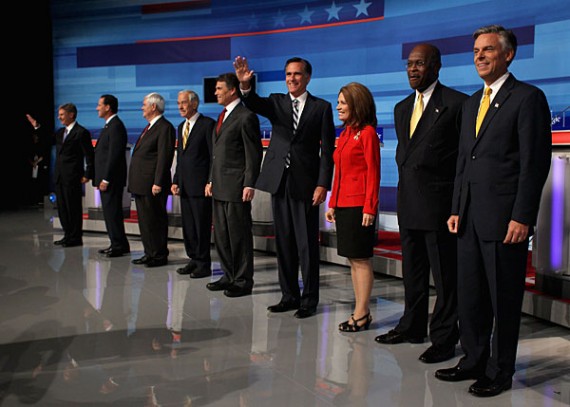

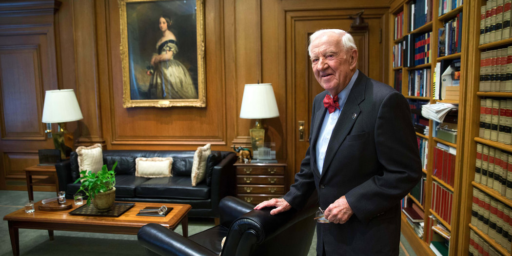
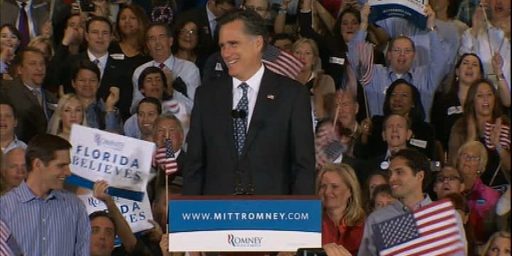
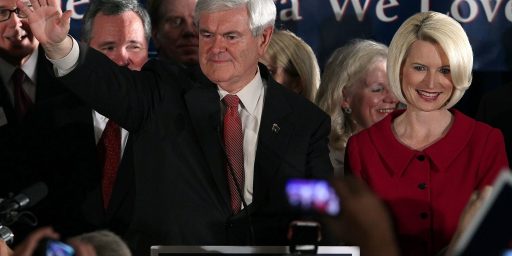

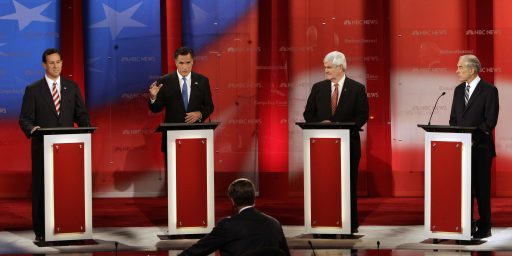
Debates are just one part of it. What about straw polls and other contests organized by the state political parties? The national committees can’t do anything about those either.
@John E. Bredehoft:
Indeed. Heck, if you really wanted to reform things I start with getting rid of caucuses. As I’ve explained before, they are anachronistic, utterly undemocratic, and give far too much influence to fringe elements in the party. It’s time we stopped pretending that Iowa’s quadrennial spectacle is some great example of American democracy. It’s not, it’s a joke.
I think that cage matches would be a much better idea. Seven go in; one comes out.
@Dave Schuler:
Make former WWE Chairman, and two-time GOP Senate Candidate, Linda McMahon the Chairman of the RNC and we can make this happen!
There’s more than a casual relationship between professional wrestling and politics. Both are notable for a complete lack of sincerity, of genuineness.
I would have paid good money to see Rick Perry and Newt Gingrich in a steel cage match.
@JWH:
Perry runs something like 5 miles every day. He would’ve taken Newt out inside of five minutes.
@Doug Mataconis:
I don’t know. Newt’s pretty nasty.
I think you’d have to bet on a point spread. Not just who would win but in how many minutes.
@Doug Mataconis:
If you want to go even further, why have two small, unrepresentative states winnow the field at the beginning? I agree with you when you say that cutting down on debates would be just the tip of iceberg when it becomes to reforming the system.
As far as debates are concerned, a total of seven would be sufficient if done properly. But how do you get the candidates and the TV stations to agree to that? And hey apparently, enough people tune in that the networks keep putting them on. Its da people’s cherce!
@Doug Mataconis:
No more of a joke than the US Senate which has to be the least democratic assembly in the developed world.
Debates are not the problem, because they test the candidates. There was dozens of debates between Hillary and Barack, and that seems to have worked well. The problem were not the debates, were the clowns that were appearing on them.
@Andre Kenji: These debates are controlled by the news media and are programmed for predetermined outcomes. You can tell because certain candidates are ignored during the debates. Others are not allowed to appear and the major networks do not want people to hear what they have to say. I always wanted to hear what Ralph Nader had to say, but the news media blocked him completely in those years when he ran. Him and many others.
Why are the Repiublicans so afraid to have their candidates’ ideas see the light of day?
The answer is pretty obvious isn’t it? The problem is NOT the debates.
Mr Mataconis is exactly right in his observation that the candidates are free to accept or decline any debate. Of course, avoid too many and one might offend an important potential voting bloc (and also run the risk of allowing a primary opponent the chance to affix a label on you without retort).
Eight were sponsored by Fox News, seven by CNN – most of them had several sponsors, many of which were state Republican Party organs. Probably a bit dangerous to avoid those.
Justin Green’s argument…
…doesn’t hold water.
The debates were not the only venue where Romney had to declare his “severely” conservative bona fides. He was doing it on the stump as well.
So the Republican solution to foot-in-mouth disease…is to shrink their mouth. Perfect.
@Doug Mataconis:
I don’t think so. Perry’s finisher would consist of three separate moves. While Perry pauses to remember what the third move is, Gingrich would win the match with a low blow followed by a chair shot.
Of course, the real question is why does anyone need to pay attention to the Republican primaries in 2016 when they have zero chance of winning. I doubt if the Democrats can screw up enough to alienate the few swing voters. The only reason for the media to pay attention to the Republican primaries is to find the next person to mock. Is the MSM willing to fund coverage just so they can make fun of the irrelevant Republicans.
@superdestroyer: John Sides already touched on your type of optimism earlier this week.
It’s premature to make your type of predictions about 2016 when we haven’t even gone through the 2014 mid-terms. The electorate nationally is within 2-4 percentage points on either side of 50% for either a Republican or a Democratic candidate. Bush-Gore you know was nearly 50-50. Bush-Kerry was 51-48. Obama-McCain was 53-46. Obama-Romney was 51-47.
We’re a quarter away from falling back into recession, and there are plenty of opportunities for the entrenched opposition party to cause the government to fail on key functions over the next three years.
Now if that happens, you may say why should that help the Republicans? It should infuriate the electorate and swing them more towards the Democrats.
I’m not sure. It may just be the impetus for the swing independents to bite the bullet and say there’s no way the country can be governed with Democrats holding the White House and Republicans in opposition in the House and in the Supreme Court. So as distasteful as it may be, let’s put a Republican back in the White House and take our chances.